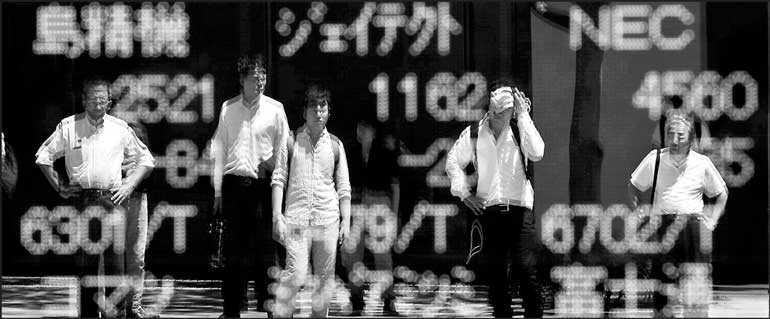Saturday Feb 21, 2026
Saturday Feb 21, 2026
Saturday, 16 November 2019 00:05 - - {{hitsCtrl.values.hits}}

Passersby are reflected on a stock quotation board outside a brokerage in Tokyo, Japan - Reuters
LONDON (Reuters): Hopes of a trade deal between Washington and Beijing turned world stock markets and other risk assets higher on Friday, though an escalating wave of global protests from Hong Kong to Chile left some deep scars.
Europe’s main bourses followed Asia and Wall Street higher (EU) after White House economic advisor Larry Kudlow said on Thursday that the US and China were getting close to an agreement and were talking every day.
“We’re getting close,” he told an event at the Council on Foreign Relations in Washington. “The mood music is pretty good, and that has not always been so in these things.”
It kept alive hopes that MSCI’s 49-country world index and Europe’s STOXX 600 could both avoid their first weekly falls since the start of October, but others had little chance.
Emerging market stocks were down 1.7% for the week, while the violent escalation of pro-democracy protests in Hong Kong left the Hang Seng down 4.7%, its worst weekly performance in four months.
Chinese blue-chip shares ended the day down 0.75% and 2.4%, their biggest fall since August, while fierce anti-government protests in Chile gave its currency its worst week since 2011 with a 7% plunge.
Shane Oliver, chief economist at AMP Capital in Sydney, likened regional markets’ bullish reaction to positive trade news to being in a relationship with an alcoholic, driven by entrenched hopes for recovery.
“Markets want to believe that there will be some sort of resolution to this issue, some sort of lasting truce at least, even though the experience of the last 18 months doesn’t give a lot of cause for comfort,” he said.
However, Oliver said weaker Chinese and US economies as well as the US presidential election next year put pressure on both sides to come to an agreement.
In currencies, the safe-haven yen weakened, with the dollar rising 0.17% to buy 108.57 yen. The euro was barely changed at $1.1023 and the dollar index, which tracks the greenback against a basket of six major rivals was off just 0.02% at 98.143.
Higher US Treasury yields also illustrated the risk-on tone in the Asian session, with the 10-year yield rising to 1.848% from a US close of 1.815% on Thursday.
The policy-sensitive two-year yield rose to 1.6101% from 1.593% on Thursday after US Federal Reserve Chair Jerome Powell said the risk of the US economy facing a dramatic bust is remote.
A Reuters poll of more than 100 economists showed that while concerns have eased over a US recession, few see an economic rebound, and most believe a trade truce is unlikely in the coming year.
Bulls vs China
Government borrowing costs in Germany and France also inched up on Friday, but were set for sizeable weekly declines, in contrast to southern European countries that have come under heavy selling pressure again this week.
Germany’s 10-year Bund yield was at -0.33% off more than one-week lows hit on Thursday. But it is down eight bps on the week, set for the biggest weekly fall since mid-August. Dutch 10-year bond yields are down seven bps this week, and French yields are five bps lower.
Data on Thursday had showed Germany’s economy grew just 0.1% in the third quarter, with consumer spending helping the country to avoid a mild contraction and a technical recession of two quarters of economic shrinkage.